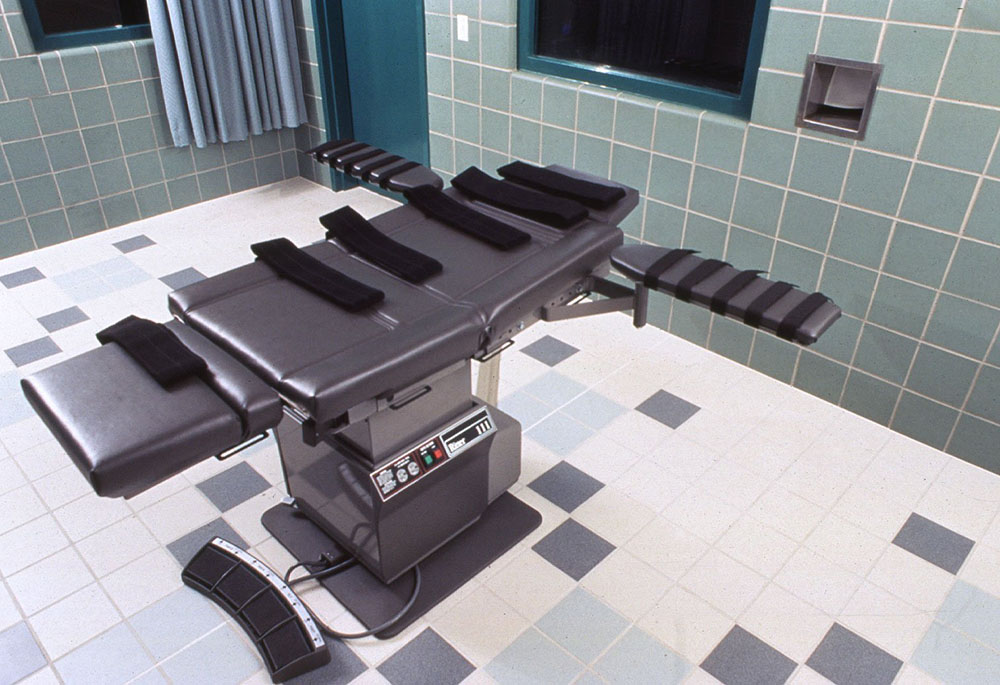
A file photo shows the lethal-injection chamber at the federal correction facility in Terre Haute, Indiana. (OSV News/Federal Bureau of Prisons)
On Dec. 26, as part of the Jubilee Year, Pope Francis opened a new Holy Door in a peculiar place: Rome's Rebibbia prison.
It's far from the first time the pope has brought attention to the incarcerated. Notably, he often chooses to wash the feet of prison inmates during Holy Thursday liturgies. And even before the Jubilee Year officially began, he once again called for the worldwide abolition of the death penalty. As an American Catholic, I believe there is neither a better time nor occasion than the Jubilee Year to abolish the death penalty in our country.
The opening of Holy Doors is a pivotal part of inaugurating a Jubilee Year in the Catholic Church, which we will celebrate this year. The foundation of these special celebrations can be found in Isaiah 61: "The Lord has anointed me; he has sent me to bring good news to the afflicted, to bind up the brokenhearted, to proclaim liberty to the captives, release to the prisoners, to announce a year of favor from the Lord."
Interestingly enough, one of the groups explicitly mentioned here is the incarcerated. And although the Jubilee Year has just begun, Pope Francis is already making good on incorporating that community into the Jubilee's celebrations.
In 2018, the pope approved edits to the Catechism of the Catholic Church, which would classify the death penalty as "inadmissible because it is an attack on the inviolability and dignity of the person" (2267). But things get hairier once we try to put this into practice, especially here in the United States, where the death penalty is still on the books in 27 states, as well as on the federal level and for the military.
In likely one of the final acts of his presidency, President Joe Biden, himself a devout Catholic, chose to commute the sentences of 37 of the 40 men on federal death row to life without parole. This is in stark contrast to his predecessor, who signed off on 13 federal executions during his tenure as president.
That very same predecessor mentioned the men who had their death sentences commuted in a Christmas message on Truth Social, saying about them, "I refuse to wish a Merry Christmas to those lucky ‘souls' but, instead, will say, GO TO HELL!"
Unfortunately, the former president's comments might not seem out of place for a country that still practices the death penalty but they are nevertheless incompatible with church teaching. And there's no denying that many of the people on death row in this country have committed heinous crimes. But in reckoning with the reality of those crimes and their victims, we must also reckon with our belief in the sanctity of life.
Lethal injection — the most commonly used method of execution in the United States — is far from the "peaceful" death it appears to be. In the state of Ohio, executions have been suspended since 2019, when Gov. Mike DeWine (himself Catholic) stopped the practice after a federal court found some of the drugs used in the lethal injection process would feel like "a sense of drowning" akin to waterboarding and "as though fire was being poured" into the inmate's veins.
Finding the above to amount to "cruel and unusual punishment," DeWine said "As long as the status quo remains, where we don't have a protocol that has been found to be OK, we certainly cannot have any executions in Ohio."
It might be a good start for DeWine. But, according to his and our faith, there is no protocol that is OK to execute someone because of our belief in the sanctity of life.
Advertisement
It might surprise readers to know that Texas — a state almost synonymous with frequent executions — is overseen by a Catholic governor, Greg Abbott. Since January 2019, 32 people have been executed in Texas. In addition, 174 men and women are on death row, and four of them are scheduled to be executed in the coming months. This is definitely unfortunate, as the sanctity of life is a concept Gov. Abbott does seem to at least in part understand, as Texas has some of the most restrictive abortion laws in the country.
There are four other states that both have Catholic governors and death penalty laws on the books: Florida, Indiana, Missouri and Nebraska. While none of them are as frequent offenders as Texas, the death penalty remains an unfortunate reality in all of them. For example, Florida has 227 death row inmates and has executed nine people over the past five years. Missouri has 10 death row inmates and has executed 13 people in the same span of time.
Indiana and Nebraska are a bit different — but by no means are they on the Catholic path. Indiana executed its first death row inmate since 2009 only last month, as the state couldn't acquire the required lethal injection drugs. This same issue has halted executions in Nebraska since 2018, but rather than taking the hint and abolishing the practice, Nebraska state Sen. Loren Lippincott proposed asphyxiating death row inmates with nitrogen instead.
Thankfully, Lippincott's proposal was indefinitely postponed in Nebraska. But in Alabama, it was put into practice on two death row inmates last year. Those who observed the execution of Kenneth Smith said it appeared painful and inhumane. Meanwhile, Alan Miller was supposed to be executed by lethal injection in 2022, but prison officials were unable to connect the IV line that would dispense the lethal drugs. CBS News also reported it was "unknown" if those being executed by nitrogen gas would be able to indicate if they were in pain during the process.
This begs the question: instead of brainstorming new, different and terrible ways to execute people, what if we just … didn't?
Is it time to name and shame? Name, perhaps, but not shame. Pray for these governors by name. Pray for Greg Abbott, Ron DeSantis, Mike Braun, Mike Kehoe and Jim Pillen to have mercy on the condemned in their states, and to remember that before they were associated with the various crimes committed, they were first children of God.
Jesus says to his disciples in the Gospel of Matthew that "whatever you did for one of these least brothers of mine, you did for me." As such, each time we execute someone in this country — innocent or otherwise — we crucify Christ anew. And a year when we are called to proclaim liberty to captives and release prisoners is as good a time as any to stop.






